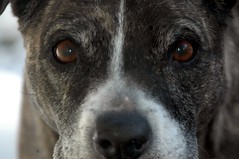Taking care of ourselves so we can care for our elderly and sick animals
 Lately the topic of compassion fatigue has been coming up for me over and over again with my clients. Night time yowling cats, banging dogs, dogs that need check ins every few hours or six meals a day. It’s exhausting! I’ve written so much about animals on this blog, and how to treat them in hospice, and how to care for them well, and how to make them better. But I feel like I need to write more about the wonderful caregivers who care for these loved animals and who don’t always take good care of themselves in the process.
Lately the topic of compassion fatigue has been coming up for me over and over again with my clients. Night time yowling cats, banging dogs, dogs that need check ins every few hours or six meals a day. It’s exhausting! I’ve written so much about animals on this blog, and how to treat them in hospice, and how to care for them well, and how to make them better. But I feel like I need to write more about the wonderful caregivers who care for these loved animals and who don’t always take good care of themselves in the process.
So here goes!
Did you know there’s a difference between a caregiver and a caretaker? I learned this recently. A caregiver is someone who gives care to another person or being with love, because they choose to, and with no resentment. A caretaker is someone who gives care to another without those elements. It doesn’t mean that they are a bad person, that they’re flawed in some way, or that they’re doing anything wrong. In fact we often times swing between caregiver and caretaker. One of the biggest elements in the swing is self-care.
No matter how much we love a person or animal, we will build up resentment if we’re not taking proper care of ourselves. It is not selfish to put ourselves in front of those we are caring for. In fact not only is it not selfish, but it is necessary for us to care well for another being.
One of my counselors once told me about the pitcher and the bowl. If you put a pitcher in the middle of a large glass bowl and you fill the bowl with water, the picture will fall over. If you once again put the pitcher in the middle of the bowl, and fill the pitcher with water first, the pitcher will fill, stay firmly planted, and then will overflow filling the bowl. We are the pitcher and we must fill ourselves before we can get to others. Otherwise we will topple over and not only not be able to take care of ourselves but not be able to take care of anyone else either. We give better care when we take care of ourselves.
 This is extremely hard to do in a society that value self-sacrifice and makes self-care out to be a selfish act. It is even harder to do when sometimes we feel it means that our loved ones do not get quite the care that we wish we could give them.
This is extremely hard to do in a society that value self-sacrifice and makes self-care out to be a selfish act. It is even harder to do when sometimes we feel it means that our loved ones do not get quite the care that we wish we could give them.
Yesterday I went for healing session for the first time with Virginia Rain down the street. She posed the question to me, what if your body was your pet? How would you treat it then? It’s an interesting question. Even those of us that do quite a bit of self-care, exercise, eating well, sleeping well, we don’t always take proper care of our body. We take it for granted that it’ll be there to support us and we don’t honor it or care for it like we would our beloved companion animals.
So what are the most important elements of self-care so we can be good caregivers to our animals?
Number one is sleep. Without sleep it doesn’t matter how much self-care we do we’re good to be a mess. Our body needs 7 to 9 hours of sleep a day. Most people I know don’t get this and most people I know taking care of a hospice animal really don’t get this. So what does this mean? It means that sometimes we have to put our animals in a different room and ignore their whining, pacing or yowling so we can sleep. This is one of the most difficult things to do for caregiver. But it’s also the most important. If we cannot do this, then sometimes we have to enlist help from a spouse, a friend, or someone else that can help us have time to sleep.
Another important thing is making sure that we get self-care for our body. Especially with larger dogs that need to be lifted and moved, we need to keep our body in good shape. Throwing your back out when you have a 70-pound dog you need to carry around is not going to be a good plan. And the time to deal with that is in prevention and not waiting until it happens. Body care can include things like getting acupuncture, bodywork or massage, chiropractic adjustments, and making sure that we have time to stretch and exercise. One of the main reasons I started Kingdom of Basil was so my human caregiving clients could get their own healing care in the same building as their animal companions.
 Emotional well being is also extremely important. It is so easy to just shove our emotions deep into our body because we don’t want to feel them. Hospice care is hard and a lot of grief comes up around watching our loved ones slowly pass away and struggle. Pushing our emotions down only makes us more ill. It’s important to have an outlet for emotions. This may be a support group, a trusted counselor, an energy healer, or someone else who can help us do release of these emotions.
Emotional well being is also extremely important. It is so easy to just shove our emotions deep into our body because we don’t want to feel them. Hospice care is hard and a lot of grief comes up around watching our loved ones slowly pass away and struggle. Pushing our emotions down only makes us more ill. It’s important to have an outlet for emotions. This may be a support group, a trusted counselor, an energy healer, or someone else who can help us do release of these emotions.
While this last suggestion may not seem that important, it really is. We need to continue to have a life. Hospice care is so emotionally draining that having some normality is really important. We need to still take time to get together with friends, to go out to eat, to connect with other people. This all will help us be better healers for our animal friends. Often times help is needed with this also. Many cities have people with businesses that can help take care of hospice animals. In West Seattle, two of my clients retired and started to pet care business. They’re able to help out with the midday care, veterinary appointments and have experience taken care special need animals. Look for something like them I’m in your city.
I think one of the most important things to remember about hospice care it is to be gentle to ourselves. No one can do it perfectly. We can’t always be there. I think a good start is to treat ourselves with the same kindness that we treat our animal companions that we care about.
Resources in Seattle
- Oceana Pet Services
- Kingdom of Basil – holistic health for animals and their people
- Hands to Paws mobile animal massage and reiki
- Wild Reiki and Shamanic healing for the whole family. Rose also does telephone sessions if you are not in Seattle
- Wellsprings Water Therapy for Dogs
Please excuse any typos – this article was written with dictation software.
